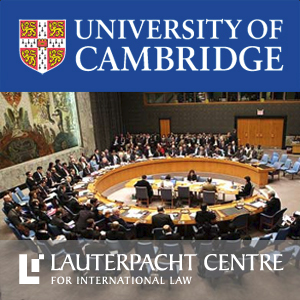'Putting the "Trade" back in Free Trade: Trade Agreements and the Framework for Consensual Bargains' by Professor Frank J. Garcia
Duration: 37 mins 28 secs
Share this media item:
Embed this media item:
Embed this media item:
About this item

| Description: |
The Lauterpacht Centre for International Law (LCIL), University of Cambridge hosts a regular Friday lunchtime lecture series on key areas of International Law. Previous subjects have included UN peacekeeping operations, the advisory jurisdiction of the International Court of Justice, the crime of agression, whaling, children and military tribunals, and theories and practices for proving individual responsibility criminal responsibility for genocide and crimes against humanity.
This lecture, entitled 'Putting the "Trade" back in Free Trade: Trade Agreements and the Framework for Consensual Bargains', was delivered at the Lauterpacht Centre on Friday 3rd February 2012 by Professor Frank J. Garcia, Professor of International and Comparative Law, Boston College Law School. For more information about the series, please see the LCIL website at www.lcil.cam.ac.uk |
|---|
| Created: | 2012-02-03 15:46 |
|---|---|
| Collection: | LCIL International Law Seminar Series MOVED |
| Publisher: | University of Cambridge |
| Copyright: | University of Cambridge |
| Language: | eng (English) |
| Keywords: | International Law; Trade Agreements; Free Trade; World Trade Organisation; Lauterpacht Centre for International Law; |
| Abstract: | In order for free trade as a policy to deliver fully on its social promise, it must be both “free” and “trade.” In fact, it must be free, in the sense of voluntary, to be trade at all. In other words, for normative and practical reasons, free trade requires that global economic relations be structured through agreements which reflect the consent of those subject to them. The neoliberal trading system today only imperfectly lives up to this obligation. In this lecture, Professor Garcia examines the role of consent in trade agreements, drawing on examples from the WTO and CAFTA as representative of important trends in multilateral and hemispheric integration systems. He argues that an investigation into the nature of trade as a human experience reveals that many aspects of current trade law and policy mix what is ostensibly free trade with something else: exploitation, coercion or predation. This has normative implications for the justification of the neoliberal trading system, and practical implications for the analysis and structure of trade agreements and the stability and security of our foreign relations |
|---|---|
Available Formats
| Format | Quality | Bitrate | Size | |||
|---|---|---|---|---|---|---|
| MP3 | 44100 Hz | 125.05 kbits/sec | 34.32 MB | Listen | Download | |
| MP3 | 16000 Hz | 31.26 kbits/sec | 8.58 MB | Listen | Download | |
| Audio Interchange File Format (AIFF) | 1.34 Mbits/sec | 378.33 MB | Listen | Download | ||
| Audio Interchange File Format (AIFF) | 250.09 kbits/sec | 68.63 MB | Listen | Download | ||
| Advanced Audio Coding (AAC) | 44100 Hz | 126.42 kbits/sec | 34.69 MB | Listen | Download | |
| Advanced Audio Coding (AAC) | 16000 Hz | 31.79 kbits/sec | 8.73 MB | Listen | Download | |
| Auto * | (Allows browser to choose a format it supports) | |||||

